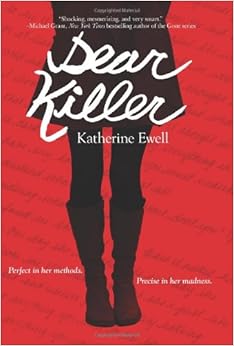Published by Katherine Tegen Book April 1, 2014
368 Pages
Stand Alone
Source: New Teen Shelf Library- serendipity
Bookologists Analysis: This book is debatable to the point
of extreme. Is it okay to read a book that questions the very idea of morals,
the foundation of right and wrong in society? (www.yourmorals.org has great
surveys/studies about morals and how you compare to liberals/conservatives and
male/female) The idea of killing people as not a necessity or enjoyment, but as
a habit and way of life is something to think about and ponder.
Full of "can't look away"
moments, Dear Killer is a psychological thriller perfect for fans of gritty
realistic fiction such as Dan Wells's I Am Not a Serial Killer and Jay Asher's
13 Reasons Why, as well as television's Dexter.
Rule One: Nothing is right, nothing is
wrong. Kit looks like your average seventeen-year-old high school student, but
she has a secret: she's London's notorious "Perfect Killer." She
chooses who to murder based on letters left in a secret mailbox, and she's
good—no, perfect—at what she does.
Her moral nihilism—the fact that she
doesn't believe in right and wrong—makes being a serial killer a whole lot
easier . . . until she breaks her own rules by befriending someone she's
supposed to murder as well as the detective in charge of the Perfect Killer
case.
As New York Times bestselling author of the Gone series
Michael Grant says, Dear Killer is "shocking, mesmerizing, and very
smart."
This book takes an awfully long time to digest as a
novel. The line it blurs really digs into your soul. The way you think is
perplexed like trying to understand a
spider web. Moral defined by Merriam-Webster Dictionary is “of or relating to principles of right
and wrong in behavior: ETHICAL; expressing or teaching a conception of
right behavior; conforming to a standard of right behavior”. I do believe that
the idea that morals change from culture to culture. In Muslim cultures women
are supposed to clothe themselves fully yet in the Western culture skinny
dipping is almost perfectly accepted (I’ve personally never done it). The way
we know right and wrong is opinioned, and Kit tries to understand the
difference between opinion and right.
This is not an
action thriller. The books itself is passive aggressive going in between the
killing and the emotional ups and downs. You don’t know what Kit is going to do
with her life. She goes back and forth between cold hearted serial killer and
wavering teenage girl who is trying to find her way through the world. Kit
finds murder an almost holy calling so that people don’t become too comfortable
in their little worlds. This way people are always on their toes and band
together to become closer and value their loved ones. It is true sometimes that
we need a reminder to think about people we take for granted and assume are
always going to be there. This book as it plays with your emotions finds a way
to unravel your thinking process to put it back together. It leaves you
wondering whether or whether you yourself actually believe the right thing. The
ending is quiet, but not unexpected as you do know that books are about change
not just chronicling boring predictable events.
The
surroundings that Kit finds her are much too plain for such an extraordinary
girl. London was most definitely the best place to set the book. It’s a large
enough city that murders aren’t to suspicious, but are still investigated. The
dreariness of London with the overcast sky (oh boy outside my bedroom it looks
overcast too) and history add an air of finesse that can’t be accomplished
anywhere else.
This book was a quiet stalker. It’s going to haunt me for a
while; I’m going to have to build my world up from the ground up trying to
comprehend what just happened. You don’t read this book for the sake of finding
of a good entertaining story, but for the reason of finding a book that makes
you question certain things. Thinking beyond the book, but also how it applies
to your own life. Rating: «««««


No comments:
Post a Comment